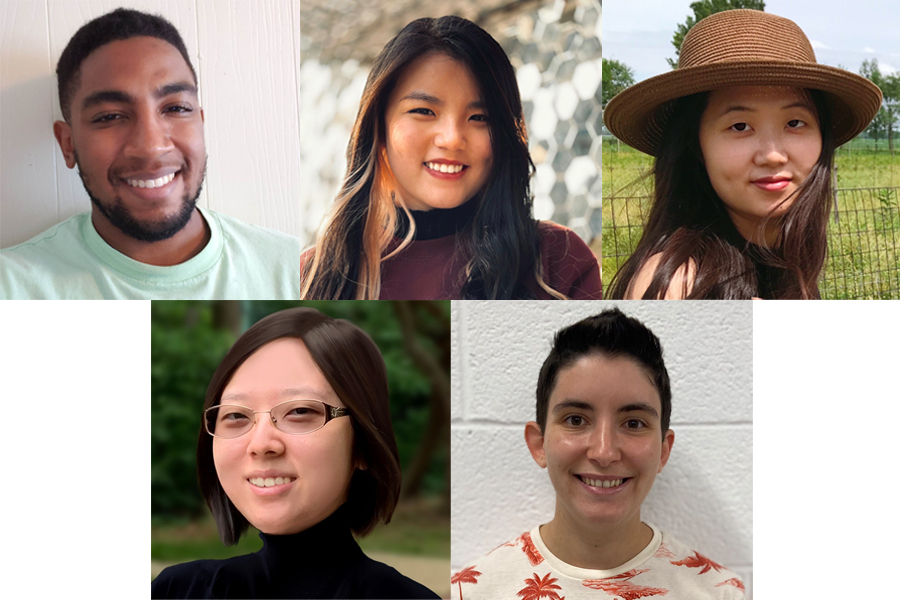

Launched in October 2020, the MIT and Accenture Convergence Industry and Technology initiative emphasizes ways industry and technology can collaborate to spur innovation. The five-year initiative aims to achieve its mission through research, education, and fellowships. To that end, Accenture has again awarded five annual fellowships to MIT graduate students working on research in industry and technology convergence who are underrepresented, including by race, ethnicity, and gender.
This year’s Accenture Fellows work in research areas including remote monitoring, human-computer interactions, operations research, Artificial intelligence-mediated socialization, and chemical transformations. Their research covers a broad range of projects, including designing low-power processing devices for telehealth applications; applying machine learning to streamline and improve business processes; improving mental health care through artificial intelligence; and using machine learning to understand the environmental and health consequences of complex chemical reactions.
As part of the application process, student nominations are invited from each unit within the College of Engineering, as well as from the four other schools affiliated with the institute and the MIT Schwarzman School of Computing. Five exceptional students have been selected as fellows for the initiative’s third year.
Drew Buzzell is a PhD candidate in Electrical Engineering and Computer Science whose research is related to remote monitoring, a rapidly growing field of telehealth in which information is collected through Internet of Things (IoT)-connected devices and transmitted to the cloud. Currently, the large volume of information involved in remote monitoring—and the time and energy costs of processing it—make data analysis difficult. Buzzell’s work focuses on edge computing, a new computing architecture that seeks to address these challenges by managing data close to the source, in a distributed network of IoT devices. Buzzell has a BA in Physics and Engineering Sciences and a Masters in Engineering Sciences from Penn State University.
Mingying (Kathy) Fang is a master’s student in the MIT School of Architecture and Planning. Her research focuses on augmented reality and virtual reality platforms. Fang develops new sensors and machine components that combine computation, materials science, and engineering. Going forward, you will explore topics including soft robotics technologies that can be combined with clothing and wearable devices and haptic feedback in order to develop interactions with digital objects. Fang holds a bachelor’s degree in mechanical engineering and human-computer interaction from Carnegie Mellon University.
Xiaoyue Gong is a doctoral candidate in Operations Research at the MIT Sloan School of Management. Her research aims to harness the power of machine learning and data science to reduce operating inefficiencies in businesses, organizations, and society. Supported by an Accenture Fellowship, Gong pursues solutions to operational problems by designing reinforcement learning methods and other machine learning techniques for embedded operational problems. Gong has a BA in Mathematics with Honors and Interactive Media Arts from New York University.
Ruby Liu is a doctoral student in the Medical Engineering and Medical Physics program, which is part of the Harvard-MIT Program in Health Science and Technology. Their research addresses the pervasive pandemic of loneliness among older adults, which leads to poor health outcomes and poses particularly high risks for historically marginalized people, including members of the LGBTQ+ community and people of color. Liu designs a network of interconnected AI agents that enhance user-agent connections, delivering mental health care while strengthening and facilitating human-to-human connections. Liu holds a Bachelor’s degree in Biomedical Engineering from Johns Hopkins University.
Jules Provenzano is a PhD candidate in Chemical Engineering. Their work integrates machine learning and liquid chromatography high-resolution mass spectrometry (LC-HRMS) to improve our understanding of complex chemical reactions in the environment. As an Accenture Fellow, Provenzano will draw on recent advances in machine learning and LC-HRMS, including new algorithms for processing real and experimental HR-MS data and novel approaches to extracting structural and kinetic transformation rules. Their research can accelerate the pace of discovery in the chemical sciences and benefit industries including oil and gas, pharmaceuticals, and agriculture. Provenzano holds a BA in Chemical Engineering and International and Global Studies from Rochester Institute of Technology.
